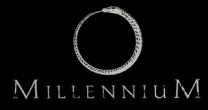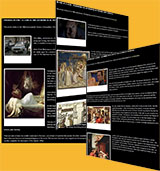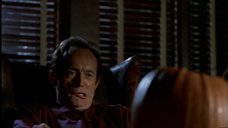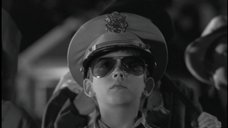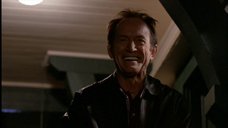The Nature of Haunting in The Curse of Frank Black
The Nature of Haunting in The Curse of Frank Black
By Brian Zager
This essay explores how the idea of ‘haunting‘ is approached in The Curse of Frank Black. I use a conceptualization of ‘haunting‘ as a process of deferral from what is present to what is absent and the reverse. Crocell‘ specter visits Frank as Frank visited Crocell many years before; in a way, they haunt each other. What is the relationship between the absent Crocell (he is dead after all) and Frank? What does this late night haunting session reveal to Frank? How does he choose to proceed in light of speaking with the ghost? Here, I too choose to invoke the voices of the dead to offer a possible reading of the episode. Through conjuring philosophers Jean-Paul Sartre, Soren Kierkegaard, and Jacques Derrida, I myself create a ghost text, evoking an atmosphere where Frank‘ existential dilemma, like ours, cannot escape being constantly haunted by that which is-but-is-no-longer there, by the lingering words of the dead.
Desiring the Apparition
It is in the desire to possess what is absent that manifests the congruity between Crocell‘ life and the path that Frank Black is following. The corporeal Crocell, wracked with anguish in depressive state, exhorts the young Frank to confirm that ghosts can return to the ones they’ left behind. His desire for a lost presence is not imbued with any portent of trepidation; rather, the thought of a return from the recently departed assuages Crocell‘ despairing self. Frank is the - young, innocent - link that Crocell seeks to mollify his distraught psyche. Tokens of his past, visible in the forms of an army uniform and a picture taken with comrades during wartime, intimate that the chaos that has descended upon him since his discharge justifies the condition that he is in. Crocell enters into a bond with young Frank, willing the boy to dis/confirm the validity of his wandering desire for presence; he yearns for someone to conjure with, to affirm the possibility of an absent-presence. Yet, all the boy can do is recite, as if by rote, that "there‘ no such thing as ghosts."
As a teenager steadfastly makes the same proclamation in the basement of Frank‘ old house, his specter becomes more than an utterance emanating from the tongues of precocious adolescent storytellers. Frank, like Crocell, has become a mythic figure whose past follows him, creating an essence that forever lives on the lips of those who are privy to some form of his story. The teens desire the thrill of the absent Frank Black, the mystery who haunts but doesn‘t show his face to speak to the curious observers. Thus, when Frank shines the flashlight on his face to scare them away, the veil of mystique is lifted and the fleshly embodiment of stories frightens the youths in its imminence. It is during this particular scene where we see a transformation in Frank‘ character. Sitting alone on the basement stairs, he acknowledges the spirit of his dead friend, suggesting that it would be a perfect time for him to show himself. Perhaps it is not a coincidence then that after hearing of his own becoming-phantom that Frank realizes the salience of openness to what such apparitions have to say, should they be given the chance.
It is finally in Frank‘ attic that desire and opportunity synergistically present themselves as Crocell has a chance to return, with Frank, to a conversation that began decades earlier. Ominously shrouded in a haze of smoke, Crocell fulfills the bond created between the spectral force and its adherent and sometimes dialogical partner. Frank listens intently to Crocell‘ warning about the metaphysical space he now operates within - and clearly outside of, as he is made manifest as a presence to Frank in his own attic. While Crocell‘ earlier desire for knowledge of apparitions has become satiated to the extent that he himself has become one, Frank‘ ontological presuppositions are implicated and challenged by the discourse of a man-who-is-a- ghost/ghost-who-was-a-man seated in front of him. It is at that moment that the whole of the text opens itself to a reading that addresses such impending existential issues regarding the disturbance Crocell‘ phantom introduces into Frank‘ conceptions of a stable reality.
The Specter as Necessary Other
The appearance of Crocell‘ ghost in the final third of "The Curse of Frank Black" acts as a hinge that permits both a regressive and progressive analysis of the episode. After this key scene, infused with oblique portents of what is to come, the past action becomes illuminated in light of what has now become imminent to Frank. Furthermore, it is precisely the ambiguity of the message revealed by the specter that acts as a door leading to another door ad infinitum, whereby the ontological problem of the ghost and its significance is only relevant to the extent that Frank embraces the uncertainty of the situation and works with the only traces that remain of the interaction, the words and the promise of a vast nothingness that awaits him.
For Frank and Crocell - as well as the viewer, implicated in the drama at a meta level - the ‘time is out of joint.‘ There erupts a discontinuity in the linear passage of time with regards to the evocation of and presence to marked phantoms. In Frank‘ first flashback, the narrative of the story being viewed is displaced by a black and white scene that predated the events just witnessed. When the teens speak of the haunting of Frank Black, they speak of a future-present, for Frank is not dead, yet he quite literally haunts his old house. Finally, when Crocell reappears to Frank decades after their only interaction, the past becomes present and hints at the future:
Conjuration signifies... the magical incantation destined to evoke, to bring forth with the voice, to convoke a charm or spirit. Conjuration says in sum the appeal that causes to come forth with the voice and thus it makes come, by definition, what is not there at the present moment of the appeal. This voice does not describe, what it says certifies nothing; its words cause something to happen. (Derrida 50)
The words of the teens and Crocell evoke at least the concept of Frank‘ future-not-yet, locating him as an unrestrained being, unlocking the present so that Frank becomes as much of an absence to himself as he is when the voices of the teens and Crocell ‘conjure‘ his specter. The teens‘ treating him as a ghost story demonstrates a possible future for Frank, as does Crocell‘ declamation that "you are becoming me." In both cases, Frank‘ previous ontological positioning is thrown into oblivion, requiring that he let go of a conception of a temporally fixed self and acknowledge his presence as a perpetual nothingness. Frank stares dubiously at Crocell‘ specter, entering into a relationship not only with the ghost, but potentiality of his own future. In this instance, Frank‘ ontological positioning and his existential dilemma lay within his realization of operating as a temporalizing being. Sartre‘ three primary ekstases arise as a useful framework to outline Frank‘ displacement as he acknowledges a continuous distancing from himself. He exists as a fixed object in the world, yet possess the power as a being-for-itself, imbued with the nihilating or separating apparatus of consciousness "to not-be what he is, to be what he is-not, and to be what he is-not and to not-be what he is-within the unity of perpetual referring" (Sartre 196). It is in the freeplay of these three dimensions of being where Sartre locates the anguish that is clearly displayed in Frank‘ disturbing encounter with Crocell‘ ghost. He is unable to be the man he was, the man with a loving family in the yellow house; he is unable to remain the stable self that he is, with the foreboding forecasts of apocalypse on the horizon; and he is condemned to make blind choices that will lead him to a future unknown.
Crocell‘ haunting makes possible the moment of disjuncture; Frank is within and outside of his own potentiality to the extent that any teleological ending that he strives to attain or understand is a "useless passion." Sartre remarks on the desire for unification in the face of constant dispersion, claiming "temporality is a dissolving force but it is at the center of a unifying act; it is less a real multiplicity-which could not subsequently receive any unity and which consequently would not even exist as a multiplicity-than a quasi-multiplicity, a foreshadowing of dissociation in the heart of unity" (194). When Derrida speaks of the threatening nature of the specter, and Hamlet of the ‘time being of out joint,‘ one notes that the disturbing attribute of spectrality is the precisely problematization of temporality:
To maintain together that which does not hold together, and the disparate itself, the same disparate, all of this can be thought...only in a dis-located time of the present, at the joining of a radically dis-jointed time, without certain conjunction. Not a time whose joining are negated, broken, mistreated, dysfunctional, disadjusted, according to a dys- of negative opposition and dialectical disjunction, but a time without certain joining or determinable conjunction. (20)
In light of the specter‘ presence, Frank realizes that the ghost can neither offer full presence or absence or answers, only the reflecting of Frank‘ being as existing within the domain of freedom/freeplay; he is not a fixed entity. Sartre advances that "this being is because the For-itself makes itself be by perpetually apprehending itself for itself as unachieved in relation to it. It is this which at a distance haunts the dyad reflection-reflecting and which causes the reflection to be apprehended by the reflecting (and conversely) as a Not-yet" (182). Crocell reflects Frank‘ indeterminate state back at him, presenting a phantom of who he is and will be, in the guise of a specter of a man who he never wished to become. The ambiguity of selfness is bestowed unto Frank in the form of an apparition which permits him to recognize the necessity of an absent-presence in order to reveal his possibilities, and thus "due to this fact the existence of a reference as a structure of being in the for-itself is still more clearly marked" (Sartre 157). The specter of Crocell acts a projected, albeit illusive/elusive self-referent by which Frank might comprehend his existential dilemma.
The effects that the specter evokes in the spectator arguably rest on the concept of being looked at by an Other, in Frank‘ case, the phantasm of Mr. Crocell. No longer alone in his despair, the addition of Crocell‘ ghostly presence severely invades Frank‘ perception of himself. With the introduction of an Other, an outside factor that beckons Frank‘ consciousness to deal with it, Frank begins to exist-himself. Since Sartre‘ thesis stands that all consciousness is consciousness of something and simultaneously self-consciousness, the addition of the apparition requires Frank‘ nilhilation of Crocell‘ specter-knowing that he is (at least) not-yet the shape that sits before him-as well as his own static being as an object in the world. The presence of the Other conjures consciousness, which permits the freeplay of the For-itself to exist in the midst of the aforementioned three primary ekstases. Crocell‘ ghost appears to Frank and subsequently reconfigures his reality, everything he held as a stable epistemological system-e.g. "there‘ no such thing as ghosts"-is turned upside down with the haunting of the apparition. The absent-presences of Crocell as well as the winged demon that intermittently appears to Frank are then manifest through a pervasive, piercing look: "And even when it is there, that is, when it is there without being there, you feel that the specter is looking, although through a helmet; it is watching, observing, staring at the spectators and the blind seers, but you do not see it seeing, it remains invulnerable beneath its visored armor" (Derrida 124). The look of the specter threatens Frank‘ reality, it is the person watching the person peep through a keyhole, the breathing in the darkness that calls the For-itself to account for itself in a moment of disjuncture. Crocell‘ specter offers Frank the chance to embrace his possibilities and change his life, to walk away from the complications that ghosts and revelations introduce into an otherwise linear life progression:
The one thing you‘ve got that I never did is that you're getting close to understanding what‘ about to happen. And he‘ been watching you. Uh-huh. Oh yeah. More closely and more often, the closer you get. Here‘ the deal, kid. Give up the fight. Sit it out. Forget about this Millennium Group. Go back to your wife and to your daughter and to your puppy and to your yellow house and just live out a nice, happy, normal life and there‘ going to be a place for all three of you afterwards. A place, believe me, where a lot of souls wish they could be.
The inauspicious gaze of the supernatural Other who has been watching Frank requires him to acknowledge the destruction of the singularity of his mission, his life project-that is, to find the evil, take care of his family, expose the Millennium Group, etc. Sartre appropriates the affectivity of the Look as a moment of disintegration to the extent that "the Other‘ look as the necessary condition of my objectivity is the destruction of all objectivity for me. The Other‘ look touches me across the world and is not only a transformation of myself but a total metamorphosis of the world" (360). Crocell‘ phantom is a necessary Other by which the truths of Frank‘ reality-e.g. the existence of the supernatural, the always disintegrating concept of a self-are opened up before him as a notion of a meaningful existence is thrown into tumult.
Anguish & Despair in the Face of the Specter
If the presence of the Other introduces conflict into a desired project of unification, Crocell‘ manifestation to Frank marks a disruption of the self in so far as the ghost is itself an "event which demands a response," while already being "constituted by that response" (Attridge 176). There is no question that the game is changed after the appearance of the specter, and Frank disintegrates into nothingness as the words emanating from the apparition are spoken to him, thus "the conjuration is anxiety from the moment it calls upon death to invent the quick and to enliven the new, to summon the presence of what is not yet there" (Derrida 135). The event causes the responses of anguish and despair in the face of the world that the specter has opened up to him; a world in which the depth of possibility is certainly crushing. Sartre describes the trepidation one feels towards considering a world of possibilities positing that "I am the self which I will be, in the mode of not being it. It is through my horror that I am carried toward the future, and the horror nihilates itself in that it constitutes the future as possible. Anguish is precisely my consciousness of being my own future, in the mode of not-being" (68). Ultimately, the external factor-e.g. ghost, demon-is not what Frank has to fear, it returns as a grim reminder that he is operating in a space of uncertainty and indeterminacy, and that his choices have and will constitute the conditions of his future. At this realization, Frank is plagued not so much with fear of a ghost, but the dizziness of anguish and despair borne of looking down into an abyss of possibility. As "the sickness unto death," Kierkegaard exalts the condition of despair as one of infinite merit. As the self is seen as a relation that relates to itself, Kierkegaard, a predecessor to Sartre, develops the forms of despair as a consequence of dealing with instability in an uncertain world. One can be in despair of being oneself, hopelessly trying to rid themselves of the accrual of their past choices and endeavors; and one can be in despair of not being oneself, afraid to propel forward from what they have constructed into the unknown. Kierkegaardian despair is the horror of a finite entity recognizing its place amidst the infinite. Like Sartrean bad faith, the being vacillates between wanting to maintain a unified, concretized sense of self, while also desiring to eschew parts of their being to become something more. This condition of constant flux, which is never to be fulfilled or unified-unless one were to embrace God as holding this position, which Sartre does not and Kierkegaard does-one way or the other is at the root of the anguishing and despairing self. The inevitable question then arises: Was Crocell‘ ghost an extrinsic entity from a parallel otherworld presenting itself unto Frank, or was the specter‘ conjuring merely a phantasy constructed by Frank in a state of despair, or both? Derrida‘ hauntology would suggest that the latter part of the question has validity to the extent that "the specter is also, among other things, what one thinks one sees and which one projects-on an imaginary screen where there is nothing to see" (125). In facing the ghost, the space of absence, there is an immediacy of nothingness, the void of freeplay that beckons and intimidates the spectator. Frank listens to Crocell‘ specter in the light of a forthcoming possibility, not necessarily a fixed end toward which Frank will proceed. The double-bind then apparent in this situation is that Frank has the possibility to change his life, not necessarily being predetermined to become Crocell. On the other hand, Frank realizes that if the specter of Crocell, and all its troubling rhetoric and implicit nefarious intent, is only one of his potential futures, then dread emerges at the thought of the other possibilities-some that are perhaps far worse than becoming Crocell-that he might encounter. Frank‘ conjuring of the specter-him-as-Crocell-integrates the reflection of the fantasy into the hall of mirrors towards which Frank is thrust. His despair both leads him into and is a symptom of the nothingness posited by the specter in so far as "the self is reflection and the imagination is reflection, the self‘ representation of itself in the form of the self‘ possibility. The imagination is the whole of reflection‘ possibility; and the intensity of this medium is the possibility of the self‘ intensity" (Kierkegaard 61). The ghost urges Frank to return back to himself, his old linear life that would seemingly not disrupt the cosmic flow or otherwise impending wicked plans of some supernatural entities. The double-bind rears its head again, to stay in bad faith as the man he was, not embracing the potential (apocalyptic) forecasts of his future, or fleeing his past situation and trying to rush an endgame in a futile effort. Frank‘ situation illustrates his anguish in the face of balancing two mutually defining axes of his existence. Sartre describes the nature of the ambiguous relationship between both wanting to be what one is, and desiring the moment of fleeing from what one has become:
"The basic concept which is thus engendered utilizes the double property of the human being, who is at once facticity and transcendence. These two aspects of human reality are and ought to be capable of a valid coordination. But bad faith does not wish either to coordinate them or to surmount them in a synthesis. Bad faith seeks to affirm their identity while preserving their differences. It must affirm facticity as being transcendence and transcendence as being facticity, in such a way that at the instant when a person apprehends the one, he can find himself abruptly faced with the other. (98)
Caught in a metaphysical game of pickle, Frank‘ anguish and despair foretell the coming of a choice that he must make in the face of uncertainty as to how he will appropriate the presence of the specter and his words into a lived existence. Crocell becomes a symptom of Frank‘ own spectrality as an indeterminate being, for "once the ghost is produced by the incarnation of spirit (the autonomized idea or thought), when this first ghost effect has been operated, it is in turn negated, integrated, and incorporated by the very subject of the operation who, claiming the uniqueness of his own human body, then becomes . . . the absolute ghost, in fact the ghost of the ghost of the specter-spirit..." (Derrida 158). Crocell‘ manifestation as but one specter haunting Frank Black gets integrated into a nebula of spirits that swirl around Frank as he continuously approaches his own nothingness with their voices in his ear.
Frank‘ condition of despair and anguish prompt forward motion as the specter eventually disappears into the night, leaving Frank alone in his attic staring at an old chest and the physical residue of the ghost left in the form of trailing cigarette smoke. Crocell‘ apparition attempted to do the work of disclosing to Frank necessary information about the afterlife and his impending damnation. However, the work actually done by the ghost provided no concrete answers to Frank, only opened up his perspective on the field of options before him. Kierkegaard‘ remarks on the despair of wanting in despair to both be oneself and to act in defiance of that self situate Frank at the heart of his own dilemma immediately after the ghost recedes into the night:
Consequently, the despairing self is forever building only castles in the air, and is always only fencing with an imaginary opponent . . . The self wants in its despair to savour to the full satisfaction of making itself into itself, of developing itself, of being itself; it wants to take the credit for this fictional, masterly project, its own way of understanding itself. And yet what it understands itself to be is in the final instance a riddle; just when it seems on the point of having the building finished, at a whim it can dissolve the whole thing into nothing. (100-101)
All that is left for Frank to do is to make his choice regarding the specter‘ warning in the face of an ambiguous future. Although Crocell‘ ghost threatened Frank should he choose the path of knowledge over ignorant bliss, the realm of potential that his apparition presented to the haunted man worked to undo any implicit goal of having Frank stay away from hunting evil in the world. Indeed, Frank must read the specter with no presuppositions; he is pulled into a space where his decisions must rest on his intuition and inclinations amidst the vast unknown.
Upon his return to the yellow house which he hastily threw eggs at the evening prior, Frank momentarily experiences the return of the specter. Although, this time the apparition does not appear in the form of Mr. Crocell, but instead a winged beast staring at Frank from inside his former home. Willfully undoing the mess he created the previous night, Frank washes the eggs off of the picture window as the creature looks on, a mirror image. The ghost has returned as a reminder, possibly as a threat to reaffirm what Crocell‘ message had been upon their meeting in the attic. With regards to the double nature of the ghost‘ return, Attridge posits that "if we fail to remember it, it will remember us. And as we cannot forget it, it cannot return" (177). As Frank dutifully scrubs at the window with a sponge, the image of the demon disappears; although likely to continue its haunting someplace else, the specter‘ presence will continue to stare back at Frank Black from the depths of the nothingness that will always trouble his-and our-existence.
Works Cited
Attridge, Derek. "Ghost Writing." Deconstruction: A Reader. Ed. Martin McQuillan. New York:
Routledge, 2001. 175-77.
Derrida, Jacques. Specters of Marx: The State of the Debt, The Work of Mourning & the New International. Trans. Peggy Kamuf. New York: Routledge, 2006.
Kierkegaard, Soren. The Sickness unto Death. Trans. Alastair Hannay. London: Penguin Books Ltd, 2004.
Sartre, Jean Paul. Being and Nothingness. Trans. Hazel E. Barnes. New York: Washington Square Press, 1993.

